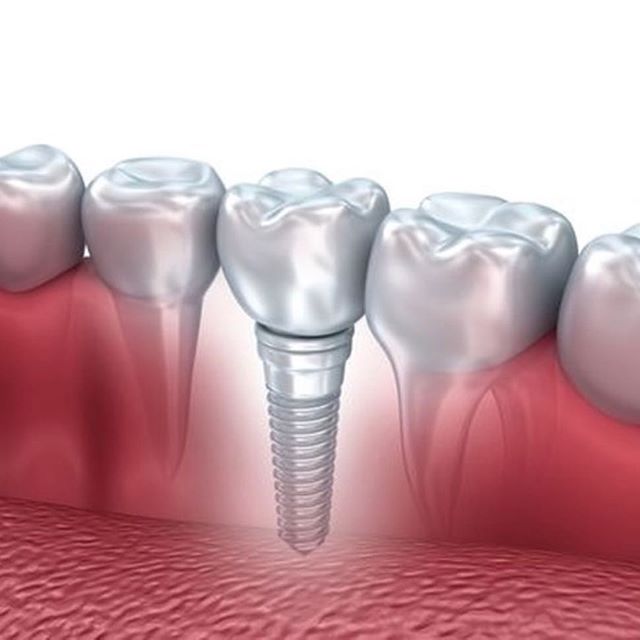Dental Implants
What is a dental implant?
A dental implant is a dental device that is used to replace a missing tooth or to serve as an anchor for dentures. The implant consists of a metal post that is implanted into the jawbone where it acts as an artificial root. The post is made of titanium, a metal that is used in many other types of prosthetics as well, including artificial joints. In implant supported bridges and dentures, the post serves as an anchor to keep the denture or bridge securely in place. When replacing a lost tooth, implant abutment is placed on the implant and serves as a connector for a crown.

What steps are involved in getting a dental implant?
Replacing missing tooth or teeth consists of two phases: a Surgical Phase and a Prosthetic (or Restorative) Phase.
Step 1 – Surgical Phase, Dental implant placement
During Surgical Phase, the implant (a titanium artificial root) is placed in the jawbone. It replaces the root of the missing tooth and fuses with the bone in a process called “osseointegration.” If your jaw doesn’t have sufficient bone to support the implant, a bone graft may be used to augment the bone. The graft can be placed along with the implant.
Step 2 – Restorative Phase, Dental implant prosthesis placement
A few weeks or months will pass before the implant is ready for Restorative Phase. At this stage, the implant abutment is placed on the implant, and a 3D scan is made. The scan is sent to the lab where custom implant crown, denture or bridge are fabricated. Then the final prosthesis is inserted and adjusted for a comfortable fit.
How long do implants last?
When properly cared for, implants can last as long as natural teeth, or longer. Although the implant and implant restoration can’t become decayed, the gum surrounding the implant is still susceptible to periodontal disease. Regular brushing and dental cleaning and checkups are still necessary to ensure your implants remain in good shape.
Post-Implant Care
Although proper oral care is crucial to maintaining good dental health, it is especially important when a patient has had dental implants. Bacteria can accumulate in the mouth and may cause gums to swell and jaw bone to recede. The recession of the jawbone will weaken implants and eventually make it necessary for the implant to be removed. Patients are recommended to have their regular dental cleaning at least twice a year to ensure the health of their teeth and implants. Our dental hygienists are well trained in dental implants maintenance.
Schedule your next appointment!

